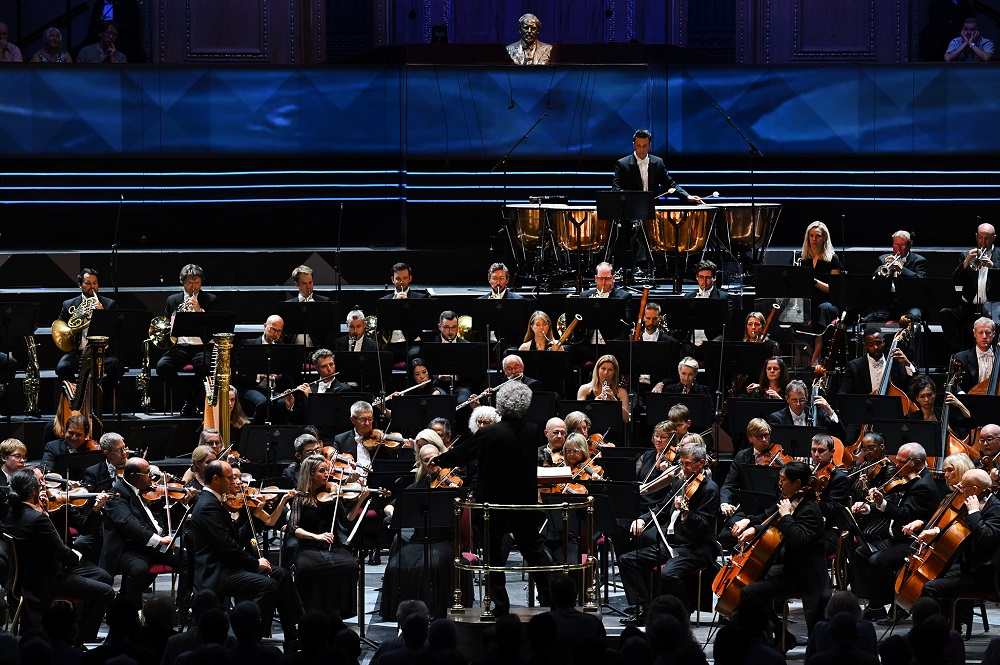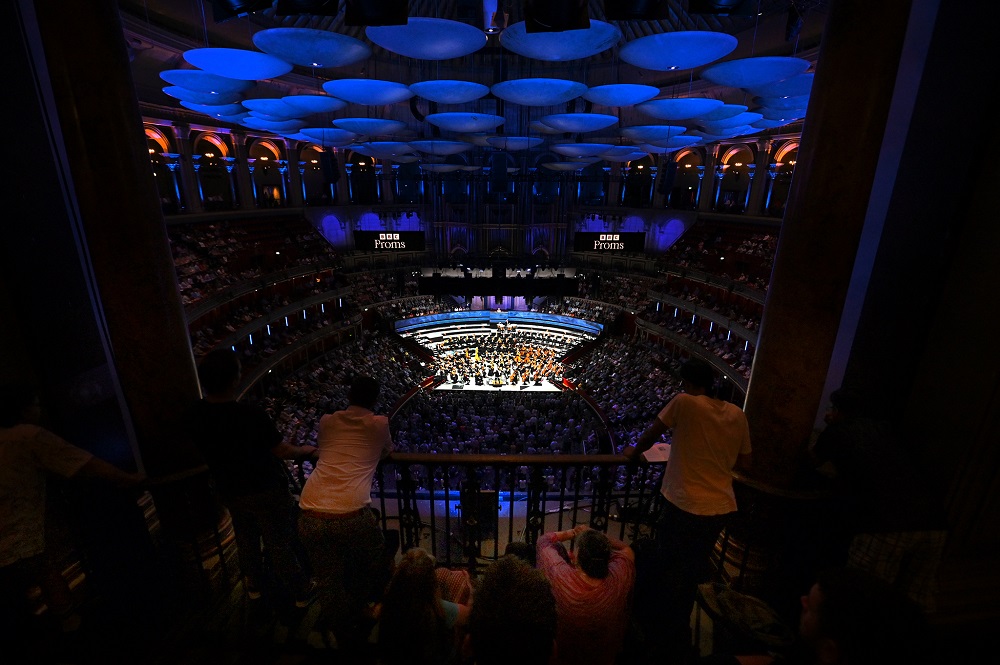Prom 65: Bruckner's Eighth, BBCSO, Bychkov review - a friendly giant | reviews, news & interviews
Prom 65: Bruckner's Eighth, BBCSO, Bychkov review - a friendly giant
Prom 65: Bruckner's Eighth, BBCSO, Bychkov review - a friendly giant
First-rate conducting and playing bring warmth and humanity to an epic trip
Bruckner's behemoth has always had its fervent champions – and its muttering sceptics. The 85-odd minutes of his Eighth Symphony, finally performed after major revisions in 1892, build into a titanic testament. Advocates read into it enough apocalyptic doom and gloom to make Wagner sound like Offenbach.
Thank the gods, therefore, that the always-impressive Semyon Bychkov guided the BBC Symphony Orchestra through across these craggy Alpine peaks at the Proms with a listener-friendly finesse, even geniality. With its explosive timpani, tank-division horns and earth-trembling low strings, the Eighth will never rest easy on the ear – or in the mind. Firm, precise, never sluggish, Bychkov let us appreciate and enjoy each stage of this giant journey rather than aiming for one heaven-storming climax after another. I relished his granular detailing. As for the big metaphysical picture: let that take care of itself.
From the outset, the BBCSO strings (led by Igor Yuzefovich) played almost like an independent state, with a policy of grace, warmth and lyricism often at odds with the dread solemnity emanating from the brass. Bychkov made the most of this dialogue, or combat, as the great paragraphs of the first movement slowly unfolded. But not too slowly: here and throughout, a decisive tread prevented any lapses into stasis. 
After the shattering crisis of the opening movement faded into its final shrug of indifference, the scherzo showed composer, and conductor, at their most convivial and accessible. If not quite easy-listening Bruckner, the expansion of its almost merry bell-peal motif had a lilt and drive that shaded into positive jubilation. The arrival of harps added an enchanting touch as a rustic song trips across Alpine meadows. Bychkov kept the tone clear, bright and even festive, only to darken the skies powerfully as a Beethovenian climax seizes hold. 
The finale I find more difficult to love. Its endless trudge up one mountain peak, only to reveal another glinting beyond it, can be hypnotic but numbing too. Still, the brass felt ferocious, then majestic, the lower strings formidable – with truly mighty basses – while Antoine Bedewi's timpani capped a stellar evening of thrilling eruptions with divine thunder from first to last. Bychkov's crescendos gripped, his pace kept steady and compelling, and the long trek picked up a relentless, cumulative force along the way. The final major-key triumph satisfied but didn't stun; but then Bychkov had always focused our gaze on the magnificent blooms in the Bruckner meadow, not just the great green swathes. Would even this rendering have converted the sceptics? The middle movements, luscious and inviting, could certainly have done so. In any case, the BBCSO played their hearts out from first bar to last. No visiting ensemble with a grand capital city in its title could have better brought this hulking work to life. More than ever, we need to cherish and protect the outsize talents close to home.
rating
Share this article
more Classical music
 Classical CDs: Swans, hamlets and bossa nova
A promising young pianist's debut disc, plus Finnish mythology and a trio of neglected British composers
Classical CDs: Swans, hamlets and bossa nova
A promising young pianist's debut disc, plus Finnish mythology and a trio of neglected British composers
 Christian Pierre La Marca, Yaman Okur, St Martin-in-The-Fields review - engagingly subversive pairing falls short
A collaboration between a cellist and a breakdancer doesn't achieve lift off
Christian Pierre La Marca, Yaman Okur, St Martin-in-The-Fields review - engagingly subversive pairing falls short
A collaboration between a cellist and a breakdancer doesn't achieve lift off
 Ridout, Włoszczowska, Crawford, Lai, Posner, Wigmore Hall review - electrifying teamwork
High-voltage Mozart and Schoenberg, blended Brahms, in a fascinating programme
Ridout, Włoszczowska, Crawford, Lai, Posner, Wigmore Hall review - electrifying teamwork
High-voltage Mozart and Schoenberg, blended Brahms, in a fascinating programme
 Sabine Devieilhe, Mathieu Pordoy, Wigmore Hall review - enchantment in Mozart and Strauss
Leading French soprano shines beyond diva excess
Sabine Devieilhe, Mathieu Pordoy, Wigmore Hall review - enchantment in Mozart and Strauss
Leading French soprano shines beyond diva excess
 Špaček, BBC Philharmonic, Bihlmaier, Bridgewater Hall, Manchester review - three flavours of Vienna
Close attention, careful balancing, flowing phrasing and clear contrast
Špaček, BBC Philharmonic, Bihlmaier, Bridgewater Hall, Manchester review - three flavours of Vienna
Close attention, careful balancing, flowing phrasing and clear contrast
 Watts, BBC Symphony Orchestra and Chorus, Bignamini, Barbican review - blazing French masterpieces
Poulenc’s Gloria and Berlioz’s 'Symphonie fantastique' on fire
Watts, BBC Symphony Orchestra and Chorus, Bignamini, Barbican review - blazing French masterpieces
Poulenc’s Gloria and Berlioz’s 'Symphonie fantastique' on fire
 Bell, Perahia, ASMF Chamber Ensemble, Wigmore Hall review - joy in teamwork
A great pianist re-emerges in Schumann, but Beamish and Mendelssohn take the palm
Bell, Perahia, ASMF Chamber Ensemble, Wigmore Hall review - joy in teamwork
A great pianist re-emerges in Schumann, but Beamish and Mendelssohn take the palm
 First Persons: composers Colin Alexander and Héloïse Werner on fantasy in guided improvisation
On five new works allowing an element of freedom in the performance
First Persons: composers Colin Alexander and Héloïse Werner on fantasy in guided improvisation
On five new works allowing an element of freedom in the performance
 First Person: Leeds Lieder Festival director and pianist Joseph Middleton on a beloved organisation back from the brink
Arts Council funding restored after the blow of 2023, new paths are being forged
First Person: Leeds Lieder Festival director and pianist Joseph Middleton on a beloved organisation back from the brink
Arts Council funding restored after the blow of 2023, new paths are being forged
 Classical CDs: Nymphs, magots and buckgoats
Epic symphonies, popular music from 17th century London and an engrossing tribute to a great Spanish pianist
Classical CDs: Nymphs, magots and buckgoats
Epic symphonies, popular music from 17th century London and an engrossing tribute to a great Spanish pianist
 Sheku Kanneh-Mason, Philharmonia Chorus, RPO, Petrenko, RFH review - poetic cello, blazing chorus
Atmospheric Elgar and Weinberg, but Rachmaninov's 'The Bells' takes the palm
Sheku Kanneh-Mason, Philharmonia Chorus, RPO, Petrenko, RFH review - poetic cello, blazing chorus
Atmospheric Elgar and Weinberg, but Rachmaninov's 'The Bells' takes the palm
 Daphnis et Chloé, Tenebrae, LSO, Pappano, Barbican review - lighting up Ravel’s ‘choreographic symphony’
All details outstanding in the lavish canvas of a giant masterpiece
Daphnis et Chloé, Tenebrae, LSO, Pappano, Barbican review - lighting up Ravel’s ‘choreographic symphony’
All details outstanding in the lavish canvas of a giant masterpiece

Add comment